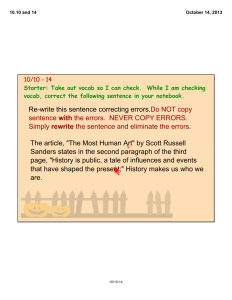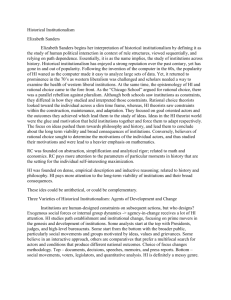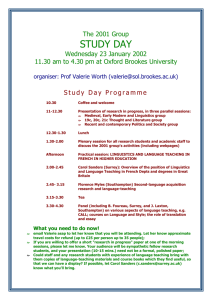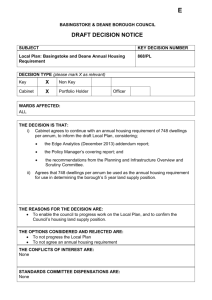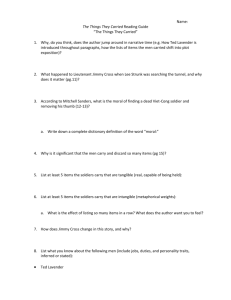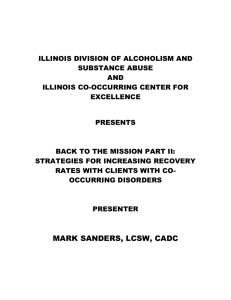Critical Essay: Under the Influence by Scott Russell Sanders Melissa
advertisement
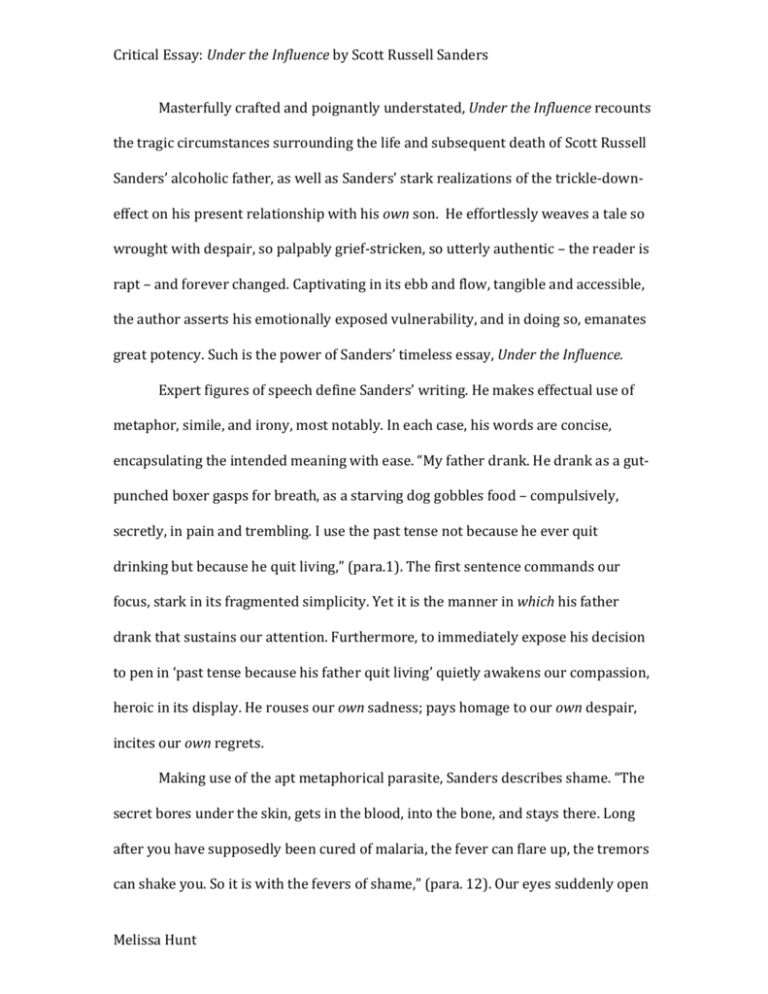
Critical Essay: Under the Influence by Scott Russell Sanders Masterfully crafted and poignantly understated, Under the Influence recounts the tragic circumstances surrounding the life and subsequent death of Scott Russell Sanders’ alcoholic father, as well as Sanders’ stark realizations of the trickle-­‐down-­‐ effect on his present relationship with his own son. He effortlessly weaves a tale so wrought with despair, so palpably grief-­‐stricken, so utterly authentic – the reader is rapt – and forever changed. Captivating in its ebb and flow, tangible and accessible, the author asserts his emotionally exposed vulnerability, and in doing so, emanates great potency. Such is the power of Sanders’ timeless essay, Under the Influence. Expert figures of speech define Sanders’ writing. He makes effectual use of metaphor, simile, and irony, most notably. In each case, his words are concise, encapsulating the intended meaning with ease. “My father drank. He drank as a gut-­‐ punched boxer gasps for breath, as a starving dog gobbles food – compulsively, secretly, in pain and trembling. I use the past tense not because he ever quit drinking but because he quit living,” (para.1). The first sentence commands our focus, stark in its fragmented simplicity. Yet it is the manner in which his father drank that sustains our attention. Furthermore, to immediately expose his decision to pen in ‘past tense because his father quit living’ quietly awakens our compassion, heroic in its display. He rouses our own sadness; pays homage to our own despair, incites our own regrets. Making use of the apt metaphorical parasite, Sanders describes shame. “The secret bores under the skin, gets in the blood, into the bone, and stays there. Long after you have supposedly been cured of malaria, the fever can flare up, the tremors can shake you. So it is with the fevers of shame,” (para. 12). Our eyes suddenly open Melissa Hunt Critical Essay: Under the Influence by Scott Russell Sanders to the veracity of this concept, and to our own inability to remove lingering, deep-­‐ seated ignominy. It truly is parasitic. Later Sanders expresses consolation found in the vast numbers affected by alcoholism. “I comfort myself with such knowledge, holding it against the throb of memory like an ice pack against a bruise,” (para.6). In this case, the sensation is most assuredly as soothing to his unrest as ice pack put to bruise. The ‘memory’ throbs, taking on attributes of physical pain, not unlike a flesh-­‐and-­‐blood headache. Somehow the pain emitted by the throbbing memory seems more real as it throbs forth from the page. In like fashion, the Ohio Arsenal, to which Sanders’ family relocated at the end of 1951, is ironically termed ‘that paradise of bombs.’ Perhaps most powerful in their graceful dance are his use of patterns prominent throughout. An audible rhythm sweeps the reader up; we are immediately pulled in by powerful phrases, intimate detail, vivid images, and demonstrable emotion. Sanders eschews ambiguity. He creates a world so rich that we are more alive having partaken. Inanimate objects come alive with Sanders’ zoomorphic descriptors. Intense hyperbole deepens our understanding of the delicate viewpoint of a grief-­‐stricken, confused child. Lists, anaphoric statements, repetend, and chiasmus solidify the story in our mind through repetition, encouraging us to join in the dance of self-­‐expression. So engaged are we that we cannot help but consider the notion. As Sanders recounts the timeline of cars that his father owned, each vehicle is endowed with animalistic traits. The 1951 Pontiac possessed a snout, his pick-­‐up was painted robin’s-­‐egg blue, and the 1963 Rambler was “shaped like a toad.” His Melissa Hunt Critical Essay: Under the Influence by Scott Russell Sanders father likewise is described as the “snoring dragon,” who snarls and growls at mother, (para. 4). We are only too aware of the base-­‐traits which unwittingly take precedence in lieu of his father’s sobriety. Sanders relatedly imagines that, “the roof might fly off, the walls might buckle from the pressure of his rage,” (para. 5). His hyperbolic command captures the child’s perspective impeccably. “He would not hide the green bottles in his tool box, would not sneak off to the barn with a lump under his coat, would not fall asleep in the daylight, would not roar and fume, would not drink himself to death, if only I were perfect,” (para. 5). Sanders’ anaphoric echo captures his perfectionism by showing – not telling. We are convinced. Similarly, by incorporating lists throughout, Sanders expands our grasp considerably. “Drowsy, clumsy, unable to fix a bicycle tire, throw a baseball, balance a grocery sack, or walk across the room, he was stripped of his true self by drink,” (para. 10). Details such as these make it all too apparent just how compromised a life his father had, by proxy, chosen. Biblical allusions strewn throughout, indicative of the author’s upbringing, make the lone chiasmus all the more relevant. “Our neighborhood was high on the Bible, and the Bible was hard on drunkards,” (para. 21). The statement as a stand-­‐ alone is incredibly potent in its reflective repetition, but maybe more so in the prelude it provides for Sanders’ guilt, self-­‐blame, and perfectionism. The ‘key’ referenced as turning in his father’s brain, (para. 39) as Sanders imagines it, is what he consciously watches for within himself as a constant, and is movingly inserted as repetend in the essay’s closing statement, (para. 49). Melissa Hunt Critical Essay: Under the Influence by Scott Russell Sanders Beyond his masterful word arrangement, Sanders has a knack for rhythm. The manner in which he talks history, then stirs deep emotion, brings us close to the boiling point, and at that instant pulls back – is like the rise and fall of the tides. The intensity varies at just the right moments, his rendering musical in its masterpiece. Dialogue is used sparingly to capture only the most crucial of spoken detail, yet we intimately understand the dynamics between characters. Not a word is wasted. Under the Influence displays the keen acumen of a brilliant writer, but moreover, the authentic presence of a vulnerable human being. It provides a deeply moving message making use of rhythmic sentence structure and arrangement, repetition of varying forms, superb metaphor and simile, and other advanced schemes and tropes. Such sophisticated tools rendered with such simplicity are almost a contradiction in terms. Perhaps all great truths are. Melissa Hunt
